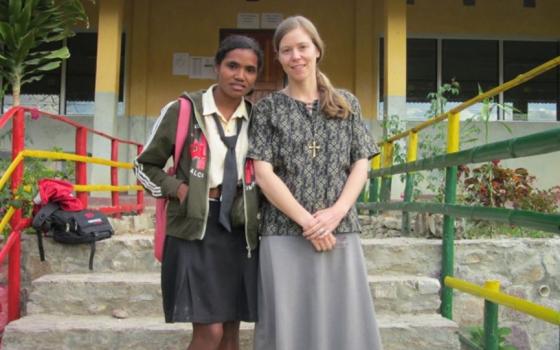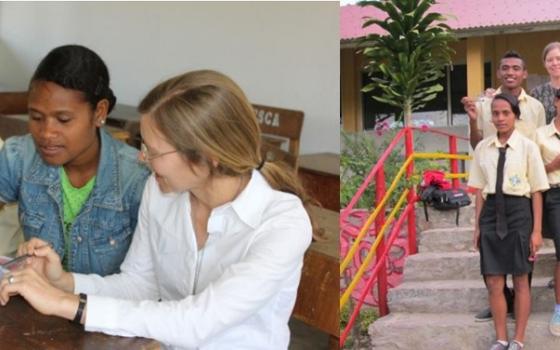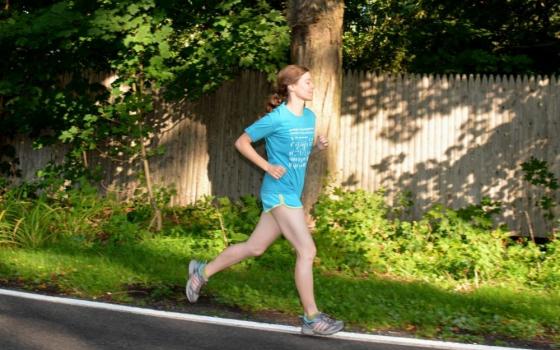For the last seven years, Maryknoll Sr. Julia Shideler has been on mission in East Timor, teaching everything from English and Portuguese to theology, biology and geology. The tiny nation is one of the poorest in Asia (and Shideler’s district, Aileu, is one of the country’s least developed), but from her classroom, Shideler has a plan to break the cycle of poverty one student at a time.
Shideler spoke to Global Sisters Report from the Maryknoll Sisters Center in New York, where she recently made her final vows and is now wrapping up a year-long period of reflection before heading back to East Timor next month.
I’ll be honest: I don’t hear a lot about what’s happening in East Timor. Could you quickly bring me (and our readers) up-to-date?
I just have to say that our mission is outside of the capital city by about an hour and a half, in a rural area. It's not a very populated district compared to others, so my experience being in East Timor is pretty much tied to being in that particular place, and so there's things that I might say in describing what East Timor is like for me that would not apply to other districts or if you were living in the capital. However, I do go to the capital for errands and things like that.
That’s fair.
What's going on in general is that the government is quite stable; the last two elections have been quite peaceful and everyone who is elected has stayed in power – there haven't been any attempts at coups. The people that get elected are respected as the leaders, and so they spend time trying to move forward the plans for development of the country. One of the things that they're doing is developing the petroleum industry because there is a lot of offshore natural gas and petroleum, and they're working with Australia to try and get a pipeline directly to East Timor. So that's driving this whole sense of need for studies of geology and other kinds of technical industries in terms of extracting mineral resources.
They’re trying to educate a new generation in things that other generations never even thought were important, like geology, petroleum studies, sustainable development and different kinds of agronomy, because they are agricultural people and their way of farming is still very traditional. So I've been really involved in teaching geology because it's a need economically to have young adults – this new generation emerging – understand land below the surface and understand the resources that they have they're sitting on.
Would you say that this “modernization” or “Westernization” is a good thing, then? Because sometimes that can be disastrous for a historically rural and agricultural community.
There's some positive things, but there's also some negative things. For example, a good thing would be irrigation systems. But things that are hazardous are the introduction of pesticides and herbicides – it runs right into the river streams, and a lot of people drink right out of the rivers and creeks without doing anything to the water first. It's a pollutant.
Another thing is with plows and fields – they're used to doing it all by hand. The problem becomes that they receive equipment like tractors, but they have no idea how to take care of it. And they don't have mechanics around to fix the tractor when it breaks down. And the same thing happens with computers in schools.
A school may get a computer and a printer, and everyone is rejoicing because they can print stuff, but then when the ink goes out, they don't know what to do. You tell them they have to go buy new ink in Dili, the capital, so they go and they discover that the right size cartridge can be like $25. So then if they have a printer but they never use it because they can't afford ink, it defeats the purpose. When you start getting people dependent on something that they don't know how to maintain, it breaks down on a level of ‘is it helpful for not?’
Is this something you deal with in the classroom? Or is that outside the scope of what you do?
With my students, I realize, as much as I would like them to go online and be able to look at all these cool pictures of the planet, it's just not realistic. I even tried to use my own laptop and projector to show a PowerPoint so that I could expose them to these images, but then the technology at the school would break down.
I realize that I had to do my own research, using the technology that was accessible to them, that assignments had to be something that every student has a chance of doing. With small groups, in order to teach them to go beyond what's normal, I let them use my computer. But I have to sit there with them and guide them and train them. Or I might buy a couple USBs and let them share.
You also started a scholarship to help Timorese attend college. Can you tell me about that?
It started at the end of 2011 when I had a group of high school seniors that I was really, really fond of. When they graduated, a number of them couldn't afford to go on to college, and my heart was kind of broken at that because they were so smart and had so much potential, and I really wanted to see them continue beyond what they had shown in high school. So I told some of them that I would find a way to help them and their parents afford it. And then a youth minister in town asked if I could help send some of his youth group members to school, and some of them happen to be my former students. So I said, ‘Sure, I'll see how much money I can get.’
I worked with him and got donations to send four of those kids to school. I just used whatever money I had from donors to help them. Then I had a couple girls and boys who I supported while they were still in high school because I didn't want them to drop out – they couldn't afford it. That's how I got started. One kid just graduated and is becoming an English teacher, so I'm really happy with him.
How have you been able to raise money?
I didn't want to keep asking individuals who had been very generous, so while I was on retreat this winter, I ran a half marathon, and people could sponsor me as a runner and all the money that I got would go to a scholarship fund.
I also asked the people in our development department if they would be able to support me by having Maryknoll create a webpage so all the donations could be taken through Maryknoll sisters, and they said that sounded like a nice idea. And I just created a little flyer that I sent to my friends and family and donors and said, 'Please forward this to whoever might be able to help.' I hope that way that I might reach more people than I could on my own.
[Dawn Cherie Araujo is the staff reporter for Global Sisters Report.]



